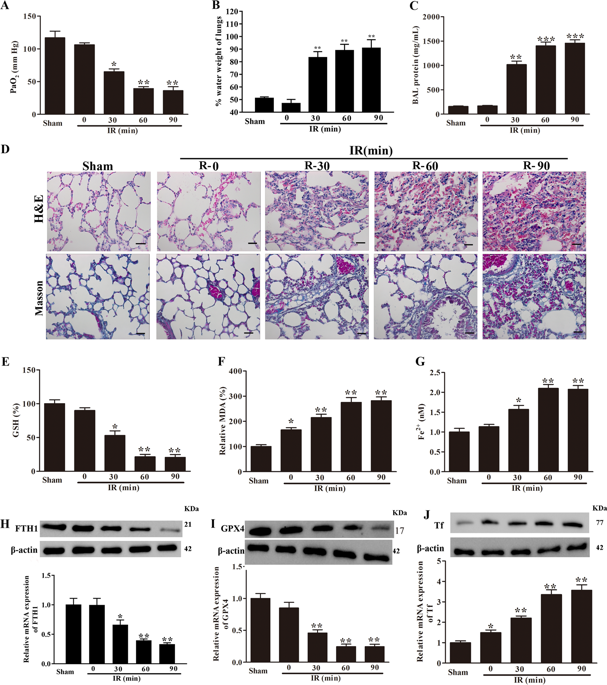Cell Death and Differentiation ( IF 13.7 ) Pub Date : 2020-03-18 , DOI: 10.1038/s41418-020-0528-x Yingchuan Li 1 , Yongmei Cao 1 , Jian Xiao 2 , Jiawei Shang 1 , Qin Tan 1 , Feng Ping 1 , Weifeng Huang 1 , Fang Wu 1 , Haijun Zhang 3 , Xiaoping Zhang 3, 4

|
Acute lung injury (ALI) is a life-threatening disorder with high rates of morbidity and mortality. Reactive oxygen species and epithelial apoptosis are involved in the pathogenesis of acute lung injury. Ferroptosis, an iron-dependent non-apoptotic form of cell death, mediates its effects in part by promoting the accumulation of reactive oxygen species. The inhibition of ferroptosis decreases clinical symptoms in experimental models of ischemia/reperfusion-induced renal failure and heart injury. This study investigated the roles of inhibitor of apoptosis-stimulating protein of p53 (iASPP) and Nrf2 in ferroptosis and their potential therapeutic effects in intestinal ischemia/reperfusion-induced acute lung injury. Intestinal ischemia/reperfusion-induced ALI was induced in wild-type and Nrf2−/− mice. The mice were treated with erastin followed by liproxstatin-1. Ferroptosis-related factors in mice with ischemia/reperfusion-induced acute lung injury or in mouse lung epithelial-2 cells with hypoxia/regeneration (HR)-induced ALI were measured by western blotting, real-time PCR, and immunofluorescence. Ferroptosis contributed to intestinal ischemia/reperfusion-induced ALI in vivo. iASPP inhibited ferroptosis and alleviated intestinal ischemia/reperfusion-induced acute lung injury, and iASPP-mediated protection against ischemia/reperfusion-induced ALI was dependent on Nrf2 signaling. HR-induced acute lung injury enhanced ferroptosis in vitro in mouse lung epithelial-2 cells, and ferroptosis was modulated after the enhancement of intestinal ischemia/reperfusion in Nrf2−/− mice. iASPP mediated its protective effects against acute lung injury through the Nrf2/HIF-1/TF signaling pathway. Ferroptosis contributes to intestinal ischemia/reperfusion-induced ALI, and iASPP treatment inhibits ferroptosis in part via Nrf2. These findings indicate the therapeutic potential of iASPP for treating ischemia/reperfusion-induced ALI.
中文翻译:

p53 凋亡刺激蛋白抑制剂抑制铁死亡并减轻肠道缺血/再灌注诱导的急性肺损伤。
急性肺损伤 (ALI) 是一种危及生命的疾病,发病率和死亡率都很高。活性氧和上皮细胞凋亡参与了急性肺损伤的发病机制。Ferroptosis 是一种铁依赖性非细胞凋亡形式的细胞死亡,部分通过促进活性氧的积累来介导其影响。在缺血/再灌注诱导的肾功能衰竭和心脏损伤的实验模型中,铁死亡的抑制减少了临床症状。本研究调查了 p53 凋亡刺激蛋白抑制剂 (iASPP) 和 Nrf2 在铁死亡中的作用及其在肠道缺血/再灌注诱导的急性肺损伤中的潜在治疗作用。在野生型和 Nrf2 -/- 中诱导了肠道缺血/再灌注诱导的 ALI老鼠。小鼠先用erastin治疗,然后用liproxstatin-1治疗。通过蛋白质印迹、实时 PCR 和免疫荧光法测量缺血/再灌注诱导的急性肺损伤小鼠或缺氧/再生 (HR) 诱导的 ALI 小鼠肺上皮 2 细胞中的铁死亡相关因子。铁死亡在体内导致肠道缺血/再灌注诱导的 ALI。iASPP 抑制铁死亡并减轻肠道缺血/再灌注诱导的急性肺损伤,iASPP 介导的针对缺血/再灌注诱导的 ALI 的保护依赖于 Nrf2 信号传导。HR 诱导的急性肺损伤在体外增强了小鼠肺上皮 2 细胞的铁死亡,并且在 Nrf2 -/-肠道缺血/再灌注增强后调节了铁死亡老鼠。iASPP 通过 Nrf2/HIF-1/TF 信号通路介导其对急性肺损伤的保护作用。铁死亡有助于肠道缺血/再灌注诱导的 ALI,而 iASPP 治疗部分通过 Nrf2 抑制铁死亡。这些发现表明 iASPP 具有治疗缺血/再灌注诱导的 ALI 的治疗潜力。











































 京公网安备 11010802027423号
京公网安备 11010802027423号